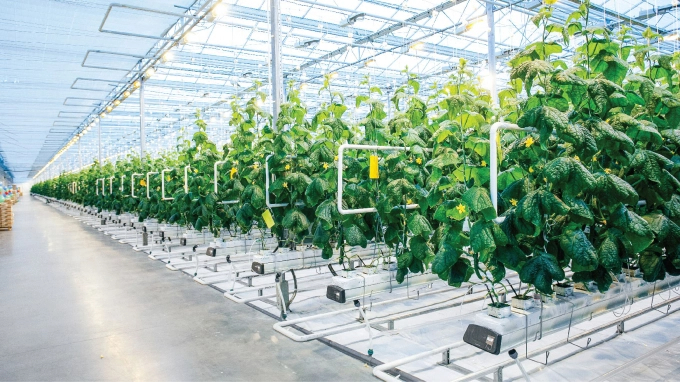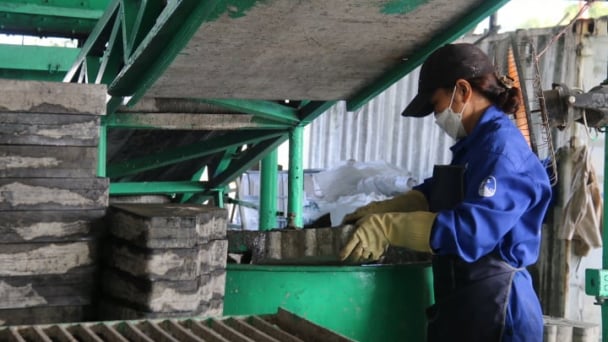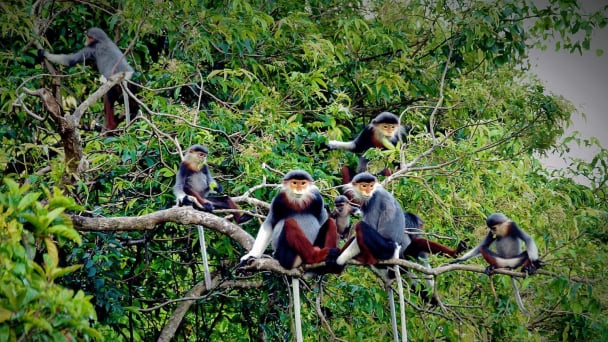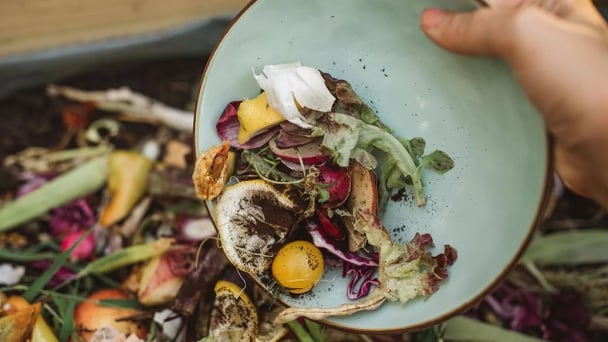May 19, 2025 | 07:37 GMT +7
May 19, 2025 | 07:37 GMT +7
Hotline: 0913.378.918
May 19, 2025 | 07:37 GMT +7
Hotline: 0913.378.918
The value of Vietnam's exported raw materials used in the production of finished goods is high, but the value of Vietnam's exported agricultural products that have been processed locally is lower.
According to research conducted by the Vietnam Institue of Strategy and Policy for Industry and Trade under the Ministry of Industry and Trade, Vietnam has encountered some limitations in exporting key agricultural products, such as the fact that a high export volume does not equate to a high export value, uneven quality of agricultural products, and a low rate of branded products.
The limited scale of domestic production, with 80% of farmers owning less than 1 hectare of production land, resulting in the difficulty of synchronous output and inconsistent production quality, is one of the causes of these constraints. Moreover, the public service system has not attained the necessary standards (the inspection, supervision, and quality management are still limited, affecting the quality of exported goods).
Therefore, in order to increase production quality and keep up with global consumer trends, organic agriculture production is an unavoidable tendency. This is also a method for enhancing the value of Vietnamese agricultural goods by introducing them to high-demand regions such as Northern Europe and Europe.

The opportunity to access the large organic market has not been grasped by many agricultural-producing countries, including Vietnam.
Due to the rising demand for health foods throughout the world, organic products have tremendous growth potential. According to a United Nations estimate, around two hundred thousand people die annually from the hazardous effects of pesticides in food. Concerns over food insecurity and chemical poisoning often motivate people to switch to organic food items.
The worldwide consumption of organic foods is projected to increase from USD 227 billion in 2021 to USD 252 billion in 2022. The worldwide organic food industry is projected to reach $437 billion by 2026, expanding at a compound annual growth rate (CAGR) of 14%. The majority of the demand for organic products comes from North America, Western Europe, and East Asia.
Recently, Vietnam's health care has experienced significant progress, particularly in the area of organic food. According to Statista, a German business specializing in market and consumer statistics, Vietnam's healthcare product market will reach USD 5.9 billion by 2022, with an average annual growth rate of more than 9% during the preceding five years. According to the Vietnam High-Quality Goods Business Association, retail sales of organic food and drinks in 2019 would exceed USD 130 million, a rather low amount. However, Vietnam represents a potential market for organic food and beverages, as consumers' earnings, living standards, and desire for safe, high-quality goods continue to rise.
The rising market share of organic products in the global marketplace presents an excellent opportunity for agricultural-producing nations like Vietnam to transition to organic agriculture. According to research conducted by the Indonesian Science Institute (PSDR-LIPI) on sustainable agriculture in Vietnam and the stories surrounding Vietnam's organic agriculture, agricultural-producing nations, including Vietnam, have not yet discovered the opportunity to access the large organic market.
Vietnam's organic agricultural area increased from 53,350 hectares in 2016 to over 240,000 ha in 2020, as reported by the Ministry of Agriculture and Rural Development. 46 of Vietnam's 63 provinces have established organic farming land, with the help of over 100 firms and 17,000 farmers. Recent estimates also indicate that Vietnam presently has sixty firms focusing on the export of organic agricultural goods with a combined 2021 revenue of USD 550 million. These numbers indicate that Vietnam's organic agriculture production is still on a limited scale.

There are obstacles to the development of organic agriculture on a large scale namely the inability to manage pests on a big scale and the high input costs.
Mr. Mike Tran, Chief Technology Officer of MEDIFOOD.IO Co., Ltd., stated that the gap in the development of organic agriculture in Vietnam is due to a number of factors, including the agricultural development orientation that emphasizes quantity over quality; the absence of a legal framework to monitor quality, and the high initial investment costs required for the development of organic agriculture.
Mr. Mike Tran stated that since its establishment in 2016, MEDIFOOD.IO has aimed to make it simpler for all consumers to access healthy food at better prices and to assist organic agricultural farmers in earning a more stable income. In addition, the firm conducts ongoing research to identify potential solutions for promoting large-scale organic agriculture production with high output and low input costs.
The inability to manage pests on a big scale and the high input costs associated with the purchase of organic pesticides and fertilizers, according to Mr. Mike Tran, are two obstacles to the development of organic agriculture on a large scale.
The majority of organic gardeners and small and medium-sized enterprises lack access to and are unaware of the organic certification and guidance assistance programs of the United States Department of Agriculture (USDA), the Commission National Organic Board (under USDA), and the European Union (EU). According to Mr. Mike Tran, authorities and departments should develop more chances and disseminate more information so that everyone has easy access to assistance services. In addition, Mr. Mike Tran requested that the Ministry of Agriculture and Rural Development allow loans and assist with the cost of filing for USDA or EU organic certification along with training programs to guide the aforementioned certifications.
Currently, the majority of organic producers lack expertise on how to properly generate organic fertilizers in the garden and get access to more efficient methods for developing large-scale organic agriculture. The MEDIFOOD.IO representative recommended collaborating with the responsible units to give technical advice and implement extreme cost-cutting initiatives.
"In order to encourage this, we are happy to provide our insecticides and fungicides for a single treatment to farms who desire and are producing organically so they may experience and remark on the fact that large-scale organic farming is practical and economically viable," said Mr. Mike Tran.
Translated by Dieu Linh

(VAN) Deputy Minister Nguyen Quoc Tri also expressed his hope that Cuba will soon overcome its current challenges, attain food security, and further expand cooperation with Vietnam.

(VAN) The project contributes to enhancing the resilience of communities vulnerable to the impacts of climate change, with a primary focus on local women.

(VAN) Green materials help save energy and resources. However, after more than 10 years, Vietnam has only developed over 200 green buildings with more than 6 million square meters of floor space.

(VAN) Vietnam - Thailand Business Forum 2025: One plus one on three connects, marking a milestone in the comprehensive strategic partnership between the two nations.

(VAN) The United Nations designated 22 May as the International Day for Biodiversity 2025 with the theme 'Harmony with nature and sustainable development.'
![Multi-channel, multi-directional Vietnamese agricultural markets: [8] A national strategy is needed](https://t.ex-cdn.com/nongnghiepmoitruong.vn/608w/files/phucpm/2025/05/15/1435-thi-truong-nong-san-viet-da-kenh-da-huongbai-8-can-mot-chien-luoc-quoc-gia-084750_728.jpg)
(VAN) The Chairman of Hung Nhon Group shared: ‘Opening up and tapping into new markets is the right and strategic direction for Vietnam's agricultural sector.’

(VAN) Food waste has become a serious issue in modern society, especially in rapidly urbanizing and developing cities like Hanoi.